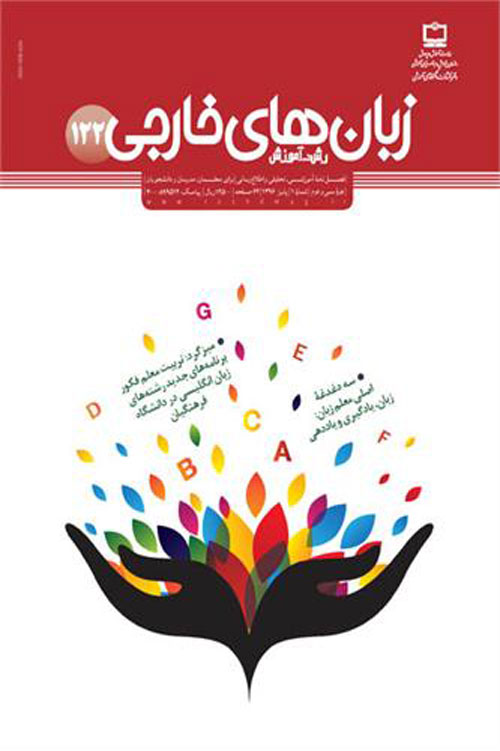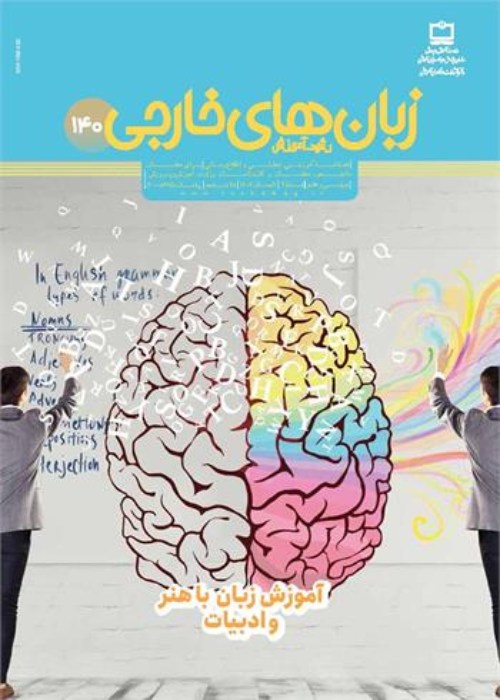فهرست مطالب

نشریه رشد آموزش زبان های خارجی
پیاپی 122 (پاییز 1396)
- تاریخ انتشار: 1396/08/15
- تعداد عناوین: 11
- یادداشت سردبیر
- رشد و تربیت معلم
- میزگرد
-
تربیت معلم فکور / برنامه های جدید رشته زبان انگلیسی در دانشگاه فرهنگیان از زبان اعضای کمیته برنامه ریزی تربیت معلم (بخش اول)صفحه 8
- معرفی کتاب
-
Page 1
Cette étude vise à envisager le fonctionnement du processus de figurativisation dans la caricature pour ensuite voir comment le niveau figuratif pourrait être utile dans lapprentissage du vocabulaire chez les apprenants iraniens de français langue étrangère (désormais FLE). Le projet se donne deux objectifs principaux: dune part, détudier le processus de figurativisation dans la caricature et considérer le parcours de réception du message grâce aux figures qui dirigent les lecteurs à mieux saisir le sens; et de lautre, il examinera le rôle de la caricature dans lenseignement/ apprentissage de français langue étrangère (désormais FLE) à laide du niveau figuratif. Dans notre travail du terrain, nous abordons notre démarche dutilisation de la caricature à laide des fiches pédagogiques en classe du FLE auprès des apprenants iraniens. Ensuite, nous évaluons, à partir dun questionnaire, le rôle de la caricature dans lenseignement/ apprentissage du FLE, en nous fondant sur le champ de lanalyse figurative.
Keywords: La caricature, le figuratif, la sémiotique figurative, lenseignement, apprentissage du FLE, le vocabulaire -
Page 12
Many teacher trainers, stakeholders and even teachers themselves have had this common belief that after graduation, novice teachers have the potentiality to apply what they have learnt in teacher-preparation programs during their first year of teaching. However, the story has been experienced in a completely different way. It means that in order to transmit the experiences of teacher education programs, to new contexts, first year teachers face different challenges or as Veenman (1984) puts, they experience some sort of a shocking reality. Though beginner teachers set ideals during their teacher education programs, due to social and political unpredictable realities of the context, they may change and reshape their goals and directions. The present article tries to review the concerns and challenges EFL novice teachers face during their first year of teaching.
Keywords: novice teachers, teaching experience, teaching practice challenges -
Page 23
The purpose of this qualitative study, conducted in one o e institutes of the private English language in Tehran, was to encourage EFL teachers to reflect on occurring in on the origins of the problems oc their classes and consequently to help them achieve a e conducive eve a certain level of self-confidence to blame themselves, not others for some of the was carried the problems in their classes. The study w out by the contribution of two of the Englis ants of the glish teachers in the institute as the participa study over a period of 90 days. As the f ess of the findings indicated, by going through the proces study, the English teachers could refle es. Also, lect on the causes of the problems in their classes the practice of dialogue journal writing hat they ng fostered their self-confidence to such a degree tha acknowledged themselves as possib s. The ble sources of the problems happening in their classes. participants perceptions regarding t sent the process of the study were also explored in the pres study.
Keywords: dialogue journal writing, EFL teachers, reflective teaching -
Page 41
The present paper reports an action research study which was conducted to investigate potential strategies for controlling and teaching hyperactive language learners. The study was conducted as part of the regular classroom instruction in three regular classes in Kish Language Institute. The effectiveness of three categories of strategies including physical strategies, cognitive and affective strategies, and behavioral and interpersonal strategies were compared. The findings showed that physical strategies are the most effective strategies for dealing with hyperactive students. The study discusses the extent to which using these strategies can help teachers to manage their classes and students to improve their learning.
Keywords: action research, classroom management, effective strategies, hyperactive students


